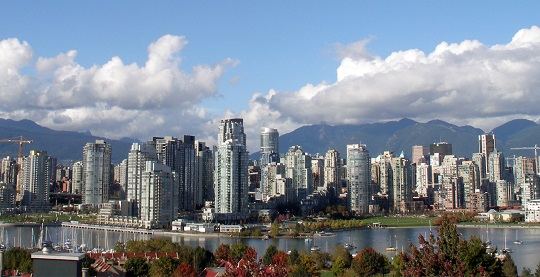It’s easy to mock efforts by localities to take on climate change – looked at in isolation and strictly by the numbers, no matter how boldly they move to trim their carbon emissions, the impact will be minimal.
Then again, when you start to add up all those little impacts – and take into account a possible galvanizing effect – the story might change.

That’s part of the thinking in Vancouver, British Columbia, where the city council last week approved Mayor Gregor Robertson’s motion to commit the city “to the long term goal of deriving 100 percent of its energy from renewable sources.”
Robertson’s motion highlighted the fact that San Francisco, Sydney, Stockholm and Copenhagen have made similar commitments in recent years, and in comments the mayor said the move by Vancouver was to some degree intended to send a signal to world leaders.
“Cities around the world must show continued leadership to meet the urgent challenge of climate change, and the most impactful change we can make is a shift toward 100% of our energy being derived from renewable sources,” the mayor said.
Clean Energy Canada senior analyst Jeremey Moorhouse noted, “In the lead-up to the Paris climate talks, Vancouver has just bolstered its reputation as a global cleantech hub, reducing carbon pollution and keeping the air clean.”
The city’s goal is bold, even if it doesn’t come with a firm target date. Thanks to lots of hydropower, British Columbia’s grid is already more than 90 percent emissions-free (although not totally free of environmental impact, of course), but Vancouver’s commitment is to green all of its energy demand, not just electricity. And in those terms, Vancouver is now at 32 percent renewables, leaving it a big mountain to climb.
A particular challenge will be in the transportation sector, where cars, trucks and buses powered by gasoline and diesel still rule. Vancouver is working on a longer-range plan to address the transportation challenges, but it already has been pursuing goals like the making majority of trips in the city come by foot, bicycle or public transportation, and trimming the average distance driven per resident by 20 percent from 2007 levels.
While Vancouver joins growing but still small number of cities taking the plunge and aiming to make all its energy use green, the more modest – but hardly insignificant – goal of 100 percent renewable electricity is in a particular sector is becoming surprisingly common. According to the Renewables 100 Policy Institute’s Go 100% Renewable Energy project:
8 Countries, 49 Cities, 56 Regions, 8 Utilities, 21 NonProfit/Educational/Public Institutions, totaling more than 50.4 million people (and counting…) who have shifted or are committed to shifting within the next few decades to 100% renewable energy in at least one sector (e.g. electricity, transportation, heating/cooling).